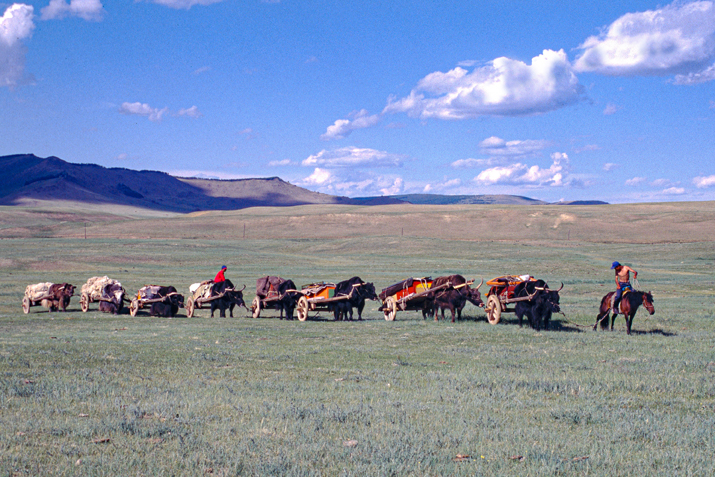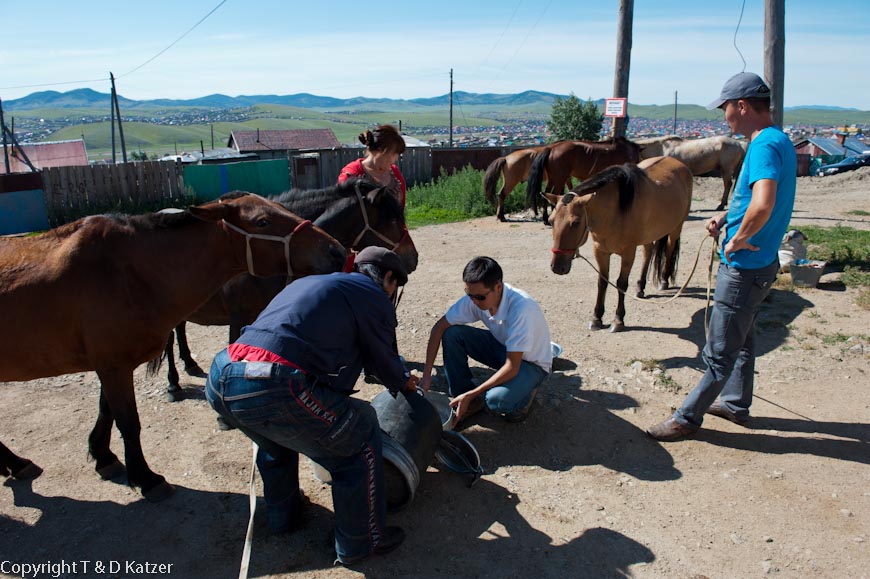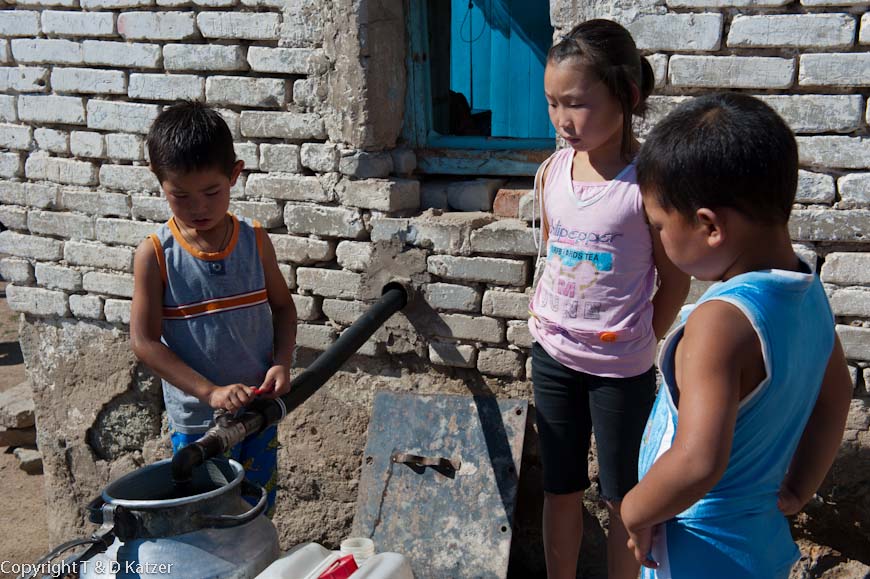
Taagii our translator has to go
N 49°01'802'' E 104°01'571''
Day: 24
Sunrise:
05:58 pm
Sunset:
8:17 pm
Total kilometers:
400
Temperature – Day (maximum):
30 °C
Temperature – day (minimum):
25 °C
Temperature – Night:
17 °C
Latitude:
49°01’802”
Longitude:
104°01’571”
Maximum height:
1415 m above sea level


We got through the first night shift well and the horses are still there in the morning. Bilgee, our new man, arrives as agreed at 9:30 on the dot. We continued our discussion from yesterday. My concerns that he had also changed his mind again overnight quickly vanished into thin air. He is worried about the horses. “You’ll die in here,” he says. “It’s better to set off today or tomorrow,” he urges with unexpected haste. “How are we supposed to manage that? It’s impossible. I’m way behind with my writing. I can hardly get to it because of the incessant events. Besides, there’s still a lot to do and we still have to cover the horse-drawn cart with fabric, otherwise everything will get wet when it rains,” I explain. After a long debate, I give in because Tanja is also in favor of an immediate departure. The plan is to break camp here tomorrow and move about 40 kilometers from here to Bilgee’s yurt camp. We can carry out the remaining work there.
Bilgee, a man of action, thinks we should water our horses. Naraa, Taagi, Ulzii, Tanja and I then lead our animals to a public water distribution point just 500 meters behind Naraa’s hut. All the inhabitants of this district get their water here and, to our surprise, have to pay 100 Tugrik (€0.17) for 50 liters. When we bring the horses back to Naraa’s garden, a minibus arrives. The driver picks up our translator Taagii. Taagii is very happy to be able to return home to his family. He came into our lives over three weeks ago to help us with the visa situation. He then became our translator and helper for all purchases and an important mediator between the nomads, guides, vendors and craftsmen. As a parting gift, we give him a weekly salary of 100,000 Tugrik (€57) for his good service. “If you need me again next year, I’ll be happy to come,” he offers. We give him about 130 kg of equipment to take to Saraa in Mörön. The driver wants the price of four passengers for the luggage. After further negotiations, we put the luggage on two seats and pay the price for three passengers. “A successful and healthy journey!” shouts Taagii from the minibus as it pulls away in the bright sunshine. “From now on, Ulzii has to translate,” I say. “It’ll work out,” Tanja replies confidently.
The afternoon passes with more shopping, such as a shovel, a file for the horse’s hooves and, above all, food for the journey. Bilgee and Ulzii accompany us to the supermarket. They turn out to be very modest. We fill five shopping carts with rice, pasta, flour, instant soups, semolina porridge, salt, sugar, instant coffee, ketchup, cookies, sweets etc. Most of these are staple foods that Bilgee wants to use to cook his usual meals.
While we pack everything into bags and organize our equipment for the horse-drawn cart, Bilgee grabs a paintbrush from us and starts painting the horse-drawn cart. From the looks of it, he is indeed a man of action. We are happy if it stays that way.
We also have fun in between the work. Tanja brings melon rinds from a watermelon to feed to the horses. All but one of the animals refuse the foreign food. It is the mare. She smells the treat, raises her head and puckers her lips like a clown. Then, on the second try, she bites into it and can’t get enough. “We all burst out laughing. “I’m going to name her after you,” Tanja calls happily to Naraa. Since then, the mare’s name has been the same as that of our always lovely hostess.
In the evening we sit together as usual, talk about the day’s experiences and what name we should give our dog. “So four eyes doesn’t sound good and it’s too long,” I interject. It should be a name that has something to do with Mongolia. What do you think of Mung? That should mean balance,” says Tanja. “This fighter doesn’t exactly seem like a balanced fighter to me,” I interject. “But I still think Mung is beautiful,” Tanja replies. But when we try to pronounce the name, the word suddenly becomes money. “Well, we can’t call him for money,” says Tanja disappointedly. Despite practicing for a long time, we can’t manage to pronounce the name in such a way that it sounds balanced. We study the Mongolian dictionary and find nothing that sounds good and that we can pronounce. Tanja tries the word dinosaur and so on. Not that we want to call our dog a dinosaur. It’s all about finding a good-sounding Mongolian word. Then the name Mogi comes up. “What does Mogi mean?” we ask. “Mogi is a Mongolian name,” we hear and the decision is made. From now on, Vierauge is called Mogi. Everyone agrees and is happy.
We’re working the night shift again today. We could get a visit from the evil nomad who wants to steal his horse, or rather our horse, again. In any case, he hasn’t shown up yet to bring us the money and get his horse back. If he doesn’t come by tomorrow, our horse crew is complete.
We look forward to your comments!

